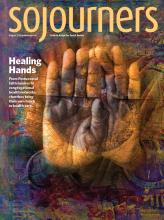WHEN CECIL WILLIAMS was 8 years old, he imagined murdering a police officer. It’s a jarring way for an influential minister to begin a memoir about radical hope and perseverance. But in a short lifetime of intense oppression, Williams had already internalized heartbreaking lessons of systemic injustice and the righteously violent tendencies that can follow. The budding young leader already nicknamed “Rev” and wise beyond his years also knew that if he could imagine brutality, he could envision a transformed society.
“Imagination is one of the most penetrating and incendiary forces I’ve ever experienced,” he writes in Beyond the Possible: 50 Years of Creating Radical Change at a Community Called Glide, co-authored with his wife and longtime collaborator, Janice Mirikitani. Building on their shared vision over a remarkable half-century, they lead what might be the most exuberant congregation in America. Glide Memorial United Methodist Church and the Glide Foundation are inextricable, legendary San Francisco institutions, the latter one of the city’s largest social service providers and the real-life shelter featured in the 2006 biopic The Pursuit of Happyness.
Writer Dave Eggers sums up Glide in the book’s introduction with a simple but uncomfortable truth: There are very few places in society where someone is not left out. Houses of worship are supposed to make a dream of inclusivity possible, but even the most inspiring visionaries live and lead imperfectly. Eggers proposes that because of the unconditional love necessary for a lasting marriage between two seemingly incompatible leaders—Williams, a black Texas minister with a solid upbringing, and Mirikitani, an agnostic Japanese-American poet from a broken, abusive home—Glide is one of the few radically accepting places where true unconditional love is practiced like the most dogmatic of faiths.
Read the Full Article
